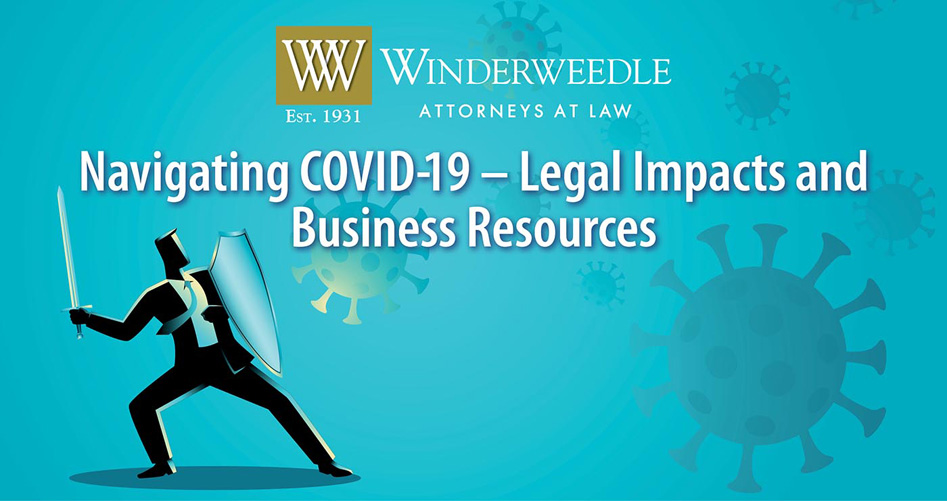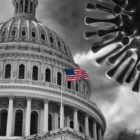Navigating COVID-19 – Legal Impacts and Business Resources

Welcome to WHWW’s library of COVID-19 related articles written and compiled by our attorneys. Check back often, as the firm is continually monitoring the latest developments across a variety of practice areas to assist you, your family, and your business in navigating the COVID-19 pandemic. Each day the federal, state and local governments are responding to new information, and new resources are available.
By: Michael C. Caborn, Esquire, Mya M. Hatchette, Esquire, and Lauren M. Reynolds, Esquire Update on Federal and State Law Impacting Evictions What landlords need to know in a nutshell: All residential evictions are suspended through October 1, 2020 in Florida. In certain circumstances, residential evictions are suspended through December 31, 2020. Landlords may proceed with commercial evictions. Key details: Landlords face a growing web of federal, state, and local laws and regulations impacting residential evictions in the wake of COVID-19. Florida’s Governor recently extended the suspension of residential evictions through October 1, 2020. Executive Order 20-211 permits the filing… The Coronavirus (COVID-19) pandemic has impacted nearly every aspect of daily life, including the need to keep a safe distance from others. We have adapted by creating solutions to limit human contact and promote health and safety, such as grocery store delivery services, virtual happy hours, and virtual at-home workouts, just to name a few. Tenants and their landlords, having been particularly hard hit by the pandemic, are looking for solutions as well. Fortunately, a few recent revisions to the Florida Statutes offer some wanted solutions to landlords and tenants by making the process of lease executions easier during this… By: Ryan E. Davis, Heather S. Moraes, and Bradley M. Saxton How does a landlord best protect and shield itself from the economic turmoil of its tenants? The Coronavirus (COVID-19) has had pronounced impacts on the retail industry, and likely will continue to affect retail for some time to come. Many retail tenants, for the first time, are finding themselves unable to pay their rent. Landlords, in an attempt to protect their spaces from going dark, are considering forbearance or deferment agreements and rent abatements to keep their tenants afloat. But what if that isn’t enough? Many retail chains and… On June 5, 2020, President Trump signed into law legislation known as the “Paycheck Protection Program Flexibility Act of 2020” or the “PPPFA” which modifies provisions under the Paycheck Protection Program (the “PPP program”) passed by Congress earlier this year. Changes under the PPPFA provide borrowers with greater flexibility regarding use of funds and loan forgiveness terms under the PPP program. A summary of key provisions of the PPPFA is provided as follows: • Covered Period Extension. The PPP program requires a borrower to spend loan proceeds within eight weeks of the PPP loan disbursement date (the “Covered Period”). Under… On March 27, 2020, President Trump signed a $2 trillion stimulus package known as the Coronavirus Aid, Relief, and Economic Security Act (the “CARES Act” or the “Act”) in response to the economic crisis caused by the coronavirus pandemic (“COVID-19”). The Act provides tax relief on multiple fronts to American families and businesses impacted by COVID-19. In recent weeks, retirees and workers have watched their individual retirement account (“IRA”) balances drop significantly as global markets have struggled through these unprecedented times. Even more troubling is that an individual who is aged 70½ in 2019 (the “Minimum Distribution Age”) is mandated… By: Michael C. Caborn and Richard B. Weinman Updated 4/6/2020 Evictions Under the Florida Supreme Court’s latest Administrative Order of April 6, 2020 (AOSC20-23) Writs of Possession, commonly used in eviction and foreclosure matters, will not be issued through the close of business on Friday, May 29, 2020. Many Judicial Circuits are issuing Orders suspending eviction activity. Recourse for unpaid rent which recently became due is unclear; however, WHWW will stay apprised of any federal or state legislation or future administrative orders related to landlords and tenants. Foreclosures Under the Florida Supreme Court’s Administrative Order of April 6, 2020 (AOSC20-23)… What happens when you cannot perform under your contracts due to complications surrounding the Coronavirus (COVID-19)? Are you excused from performing or are you permitted to delay performance of your obligations? Can you terminate the contract entirely? The short answer is, it depends. Each situation is individual and specific to the contract language and circumstances of the parties. That being said, the following outlines some common questions and factors to consider when reviewing rights and obligations under your contracts: Is COVID-19 an event of force majeure? A force majeure clause is a contractual provision that excuses performance of one or… Recent government enforced closures, social distancing and a general change in commerce as a result of the effects of COVID-19 are having astronomical impacts on retail tenants throughout the United States. Retail tenants and their landlords are struggling with how to respond to the sudden loss of sales. Do Tenants have a right to abatement of their rent if they can’t keep their stores open? If not, what else can be done? The following are a few tips to avoid defaults and evictions, minimize loss of rental income, and aid in a successful settlement. TIP I: Cooperate and Communicate, Communicate,… The information provided below contains summaries of tax relief as of March 27, 2020. Federal Tax For Individuals Federal Income Tax Returns and Payment. The deadline to file federal income tax returns and remit payment is extended to July 15, 2020. This extension is automatic and applies to individuals, trusts, and corporations. Any interest, penalty, or addition to tax, for a failure to file or a failure to pay will not accrue until July 16, 2020. Rebates for Individuals. The Coronavirus Aid, Relief, and Economic Security Act (the “CARES Act” or the “Act”) provides rebates for eligible taxpayers of up… The first place to look is the insuring agreement. The type of coverage matters: first party coverage means the insurance company pays you for loss, as opposed to third party coverage, which defends and indemnifies you against loss by a third party. Facts are critical, including: Did an event occur that is covered under the insuring agreement? Is there an exclusion that could cause the insurer to deny your claim? Business interruption coverage typically requires “direct physical loss or damage.” A possible argument could be made that “damage” occurred due to contamination of the workplace or property if the virus… Many resources are available that can help businesses with cash flow and working capital needs. We prepared this page to provide general information about resources that might be available to assist businesses with cash flow needs during the COVID-19 crisis. Terms of loans may vary. This does not cover all possible financing resources – there are still a number of other non-emergency SBA programs still active (for instance, SBA Express Loans – a non-disaster type loan – was increased in limits from $350,000 to $1,000,000 under the CARES Act). Please consult with your attorney and financial institution for details specific… On March 9, 2020, Governor of the State of Florida, Ron DeSantis, declared a State of Emergency for COVID-19 which required Florida government officials to take necessary and timely precautions to protect their communities. See Executive Order 20-52. In response to the social distancing guidelines and limitations on public gatherings, numerous county and local bodies contacted the Governor’s office with regard to concerns about conducting public meetings. Governor DeSantis requested an advisory opinion from the Florida Attorney General, and on March 19, 2020, the Florida Attorney General issued its Advisory Legal Opinion on public meetings and quorums using technology. See… By: Jeffrey Deery and Brandon S. DeGel The coronavirus pandemic (COVID-19) continues to have, a massive impact on our global, national, state, and local economies. Undoubtedly, along with its devastating health and social effects, this dangerous virus will also bring a wave of disputes and conflicts. So, in an age of social distancing, how are these disputes to be handled? Historically, parties have resorted to the court system as a forum for resolving their disputes. However, Florida’s judicial system, just like every other industry, has been forced to take measures to mitigate and slow the spread of the coronavirus. Specifically,… By: Ryan E. Davis, Bradley M. Saxton and C. Andrew Roy The CARES Act greatly expands the availability of businesses to use new bankruptcy law that makes it easier to reorganize. Among other things, the CARES Act also provides for direct stimulus to individuals, limited temporary relief for student loan borrowers, and greatly expands SBA loan relief for small businesses (including the possibility that the loan may be forgivable). The Small Business Reorganization Act became effective in February 2020, ushering in the new “subchapter 5” of Chapter 11. The SBRA generally allows small businesses and individuals to reorganize based on… By: Heather S. Moraes, Mya M. Hatchette, J. Jeffrey Deery, and C. Andrew Roy Thank you to those who were able to attend the WHWW zoom discussion today. For those of you who missed or want to see it again, the link to the lecture and material is below. VIEW DISCUSSION Update on Federal and State Law Impacting Evictions and Foreclosures
New Florida Laws Provide Solutions for Landlords and Tenants During the Pandemic
Q&A for Landlords: Keys to Surviving Tenant Bankruptcies
Favorable Modifications to Paycheck Protection Program
Sweeping Tax Relief Provided to American Families and Businesses under the CARES Act
Florida Foreclosures and Evictions – Related to COVID-19 Emergency Measures
The Coronavirus and Your Contracts. What Now?
The Coronavirus, Force Majeure and Lease Workouts: Tips for Landlords and Tenants
Tax Update – Summaries of COVID-19 Related Federal and State Tax Relief Updates
Does your Insurance Policy Cover Business Interruption Claims Relating to COVID-19?
Cash Flow and Working Capital Relief Resources for Businesses
Suspension of Sunshine Law and Virtual Public Meetings
From the Courthouse to Your House – Dispute Resolution Options during a Global Pandemic
CARES Act Greatly Expands Eligibility for Small Business Reorganization
COVID-19: Navigating Through Contracts and Business Operations During the Pandemic















